Opposition Group Claims Iran Creating Naval Proxy Militia
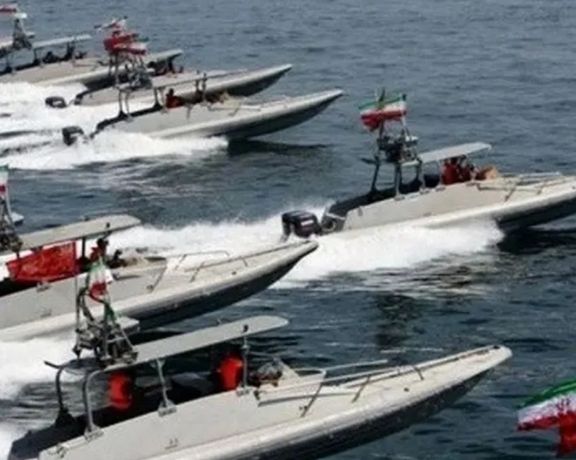
An Iranian opposition group claims the Islamic Republic’s Revolutionary Guard has formed a naval militia unit to help its proxy forces.

An Iranian opposition group claims the Islamic Republic’s Revolutionary Guard has formed a naval militia unit to help its proxy forces.
According to a report by the National Council of Resistance of Iran, which is the political wing of the Mujahedin-e Khalq (MEK), the new naval militia is part of the Qods (Quds) force, which operates outside of Iran’s borders.
"The Qods Force has been recruiting mercenaries for newly created, armed and trained terrorist units to attack ships and maritime targets in the region," it said, alleging that the naval unit is recruiting people from Iraq, Lebanon, Syria, Yemen and Africa.
The 55-page report says the IRGC is training the units in the Caspian Sea district of Zibakenar in the northern province of Gilan before deploying them to the Arabian Sea, the Bab el-Mandeb Strait between Yemen and the Horn of Africa and the Red Sea.
The group said the mission of the new unit is to "disrupt maritime navigation of commercial ships, to attack ports, conduct ship hijackings and plant mines", and provided examples of such operations using small boats off Yemen's Red Sea port of Hudaydah.
It is not immediately possible to verify the claim, but the IRGC has an active military academy in the coastal county of Zibakenar since 2015.
Earlier last month, the US seized thousands of weapons destined for the Houthi rebels in Yemen from the Iranian port of Jask.
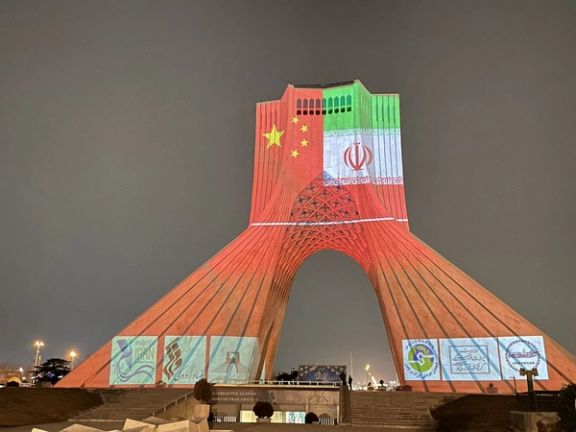
The projection of China’s flag for Chinese New Year on the Azadi monument in Tehran has irked hundreds of Iranian social media users.
Both Iranian and Chinese flags were beamed onto the well-known landmark for several hours during a ceremony Sunday attended by the Chinese ambassador. Tehran municipality officials said the ‘video-mapping’ had been proposed by the Iran-China Friendship Association.
Foreign minister Hossein Amir-Abdollahian posted a photo of the event on Twitter Sunday evening, offering good wishes to the Chinese government and people for New Year and over hosting the Beijing Winter Olympics. "We will implement the comprehensive cooperation plan between the two countries with vigorous energy, so that the second 50-year-old Iran-China relationship will be even more powerful!" Amir-Abdollahian wrote in his tweet.
But the display of the Chinese flag was too much for some social media activists who detected a sign of "concessions" to Beijing and "Iran's colonialization by China."
"God on the same level as the Communist stars?” one Twitteratus opined. “Do you know what you are doing Mr. Abdollahian? Haven't you seen the Iranian people's reaction? Or maybe it's more important to keep the Chinese happy rather than us people…?”
Twitterati left angry comments under Amir-Abdollahian's post, with one using the hashtag No-to-Chinese-Globalism and evoking the 1979 slogan "Neither West, Nor East.”
"You have dressed the symbol of Iranian's freedom and independence in the flag of a foreign power and felicitate them on colonizing you. Happy anniversary of the Revolution!" another angry comment read.
While some Iranians take umbrage at Iran’s efforts to expand relations with China, and especially at the 25-year cooperation pact agreed in March, China’s regional role is growing fast.
The New York Times noted Tuesday that “in January alone, five senior officials from oil-rich Arab monarchies visited China,” and suggested that for a range of Middle Eastern countries “China promises to be a long-term buyer of oil and gas and a potential source of investment, without the political complications involved in doing business with the United States.”
Some Twitterati defended the display of the Chinese flag, noting that video-mapping national monuments with other countries' flags or symbols on suitable occasions was done widely around the world. One posted a photo of video-mapping of the Eiffel Tower in Paris in tribute to 16 Iranian firefighters who lost their lives in incident in Tehran in 2018.
The Islamic Republic's expanding relations and long-term partnership with China has stirred much controversy among Iranians, particularly since March 2021 when Iran and China signed a 25-year cooperation pact.
Built in 1971, the Azadi monument was originally named Shahyad (the Shah’s Monument) but renamed after the ruler was toppled by the 1979 Revolution.
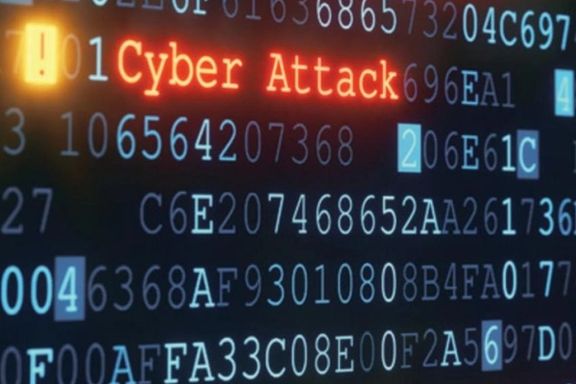
An Iranian hacking group with links to the Intelligence Ministry has attacked high-profile targets in Turkey.
According to a report by tech news website ZDNet on Tuesday, the Iranian advanced persistent threat (APT) group MuddyWater has penetrated the Turkish health and interior ministries as well as private companies to gain access to customer data.
An APT is a stealthy threat actor, typically a nation state or state-sponsored group, which gains unauthorized access to a computer network and remains undetected for an extended period.
Researchers at Cisco Talos Intelligence Group -- one of the world’s largest commercial threat intelligence teams -- said last week that the latest MuddyWater campaign dates to November 2021, when they sent phishing emails to many Turkish users.
The emails were spoofed to look they’re from the health and interior ministries and utilized malicious PDFs and Microsoft Office documents as an initial attack vector.
Since at least 2017, MuddyWater -- also known as Mercury or Static Kitten -- carried out attacks against organizations in the US, Israel, Europe, and the Middle East, including a months-long effort to breach government networks in Turkey, Jordan and Iraq.
Earlier in January, the US military officially confirmed that Iran's intelligence ministry is connected to the cyber espionage group.
Earlier on Tuesday, the US State Department announced up to $10 million reward on two Iranian cyber actors for trying to interfere with the 2020 presidential election.
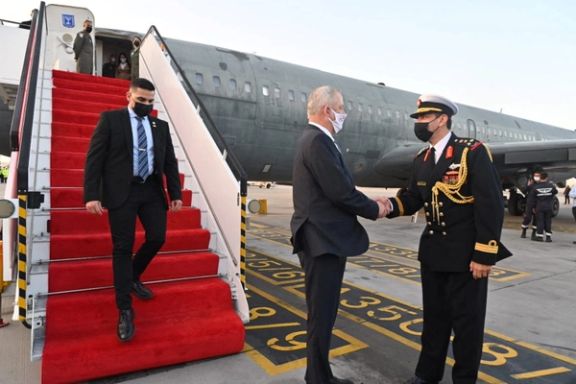
Israeli Defence Minister Benny Gantz began a visit to Bahrain on Wednesday amid heightened tensions in the Gulf after missile attacks on the United Arab Emirates by Yemen's Iran-backed Houthi movement.
Announcing Gantz's trip only after his arrival in Manama, Israel's Defense Ministry said he would sign a security cooperation agreement with Bahrain, which along with the UAE normalized relations with Israel in 2020.
The United Arab Emirates on Monday intercepted a missile during a visit by Israel's president, the third such attack in two weeks claimed by the Houthis.
In disclosing Gantz's official visit, the Israeli defense ministry made no mention of the Houthi attacks nor gave details of what a security accord with Bahrain would include.
Israel this week is taking part in a large Middle East naval exercise for the first time publicly joining Saudi Arabia and Oman, two counties it has no diplomatic relations with.
Gantz flew to Bahrain on an Israeli air force transport plane. It was the first time an Israeli defense chief had visited the Gulf nation or that an Israeli military aircraft had landed there.
"Honored to be here and looking forward to meeting the Kingdom's leaders," Gantz wrote on Twitter.
The US-brokered Abraham Accords signed by Bahrain, the UAE and Israel built on common commercial interests and worries about Iran.
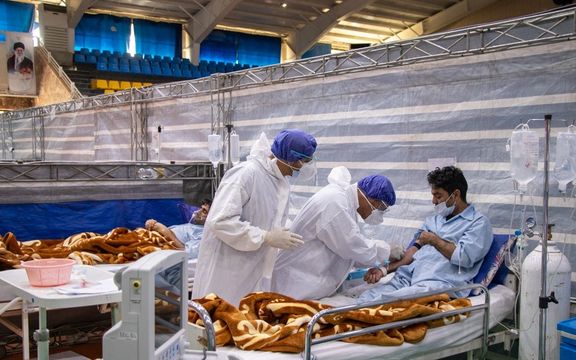
The Omicron variant of Covid-19 is sweeping through Iran while authorities haven’t decided on possible restrictive measures yet.
Health Minister Bahram Eynollahi said on Wednesday that some of the proposals about nationwide lockdowns by the ministry are not approved by the country’s Covid-19 taskforce despite the increasing rate of infections and hospitalizations.
Eynollahi said when the contagion reaches a peak, patchy quarantine or isolation of cases will be ineffective, calling for a total lockdown.
The authorities’ hesitation to announce nationwide shutdowns may be attributed to the government plans to hold celebrations, including nationwide rallies to mark the anniversary of the 1979 revolution.
This would not the first time the Islamic Republic prioritizing official events over the health and safety of people. There were media allegations that authorities played down the threat from Covid back in early 2020 so as not to deter voting in the parliament election.
Last Thursday, the health minister announced the start of the sixth wave of the coronavirus pandemic as hospitals reported an increasing number of referrals related to the highly infectious Omicron variant.
According to latest reports, over 40 cities are designated as “red zones”, which means hotspots with the highest number of cases, while the daily verified cases on Wednesday were over 38,000.
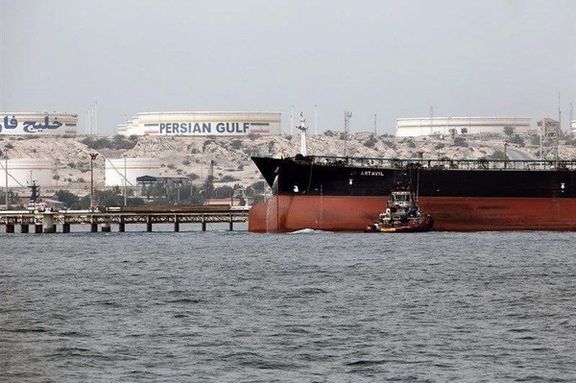
Iran’s oil export income grew by 494 percent in the first 5 months of the Raisi administration, Fars news agency affiliated with the Revolutionary Guard reported Tuesday.
The report is an attempt to shed a positive light on the embattled hardliner government, covering a range of budgetary and other economic indicators, but the claim about more oil exports is not too far from other estimates showing weakness in enforcing United States sanctions.
Fars said that from mid-August when Ebrahim Raisi took office until mid-January, Iran sold about $2.8 billion of oil and related products, while in the last four months of the previous administration oil exports totaled just $500 million. (The report mentions the figures in rials, and we converted the amounts using an average exchange rate of $1=250,000 rials.)
The Raisi administration and its political allies almost on daily basis try to show that his government has a far better record in economic performance, including circumventing Unites States’ sanctions.
Putting the two figures together, Iran is still far behind in meeting its budget estimate from oil revenues. The roughly $3.3 billion dollars accrued since the beginning of the Iranian fiscal year on March 21, 2021, constitutes less around 30 percent of the budget projection for oil sales in this fiscal year. Iran’s original projection was to export around $15 billion in this period.
Current estimates of oil sales vary widely, ranging from 650,000 to more than one million barrels a day, with China boosting its imports in the final months of last year. However, Iran sells it oil with a big discount, according to its own officials, but both the true volume of exported oil and its price remain a secret.
The $3.3 billion reported by Fars for total oil exports since August seems low, even if we take the lower estimated exports by the discounted price of $50 per barrel, Iran should have made close to $5 billion in five months. Therefore, there are three possibilities: The figures mentioned by Fars are wrong; the estimate of 650 barrels per day is too high; or Iran is offering buyers much steeper discounts.
Fars claims that its report is based on information collected from official sources.
The report also claims that borrowing from the central bank declined by 30 percent since raisi assumed office, but this assertion amounts to an accounting gimmick.
The government sold about $5.4 billion of “Islamic Bonds”, which is another term for indirect borrowing from the central bank. A large enough private capital market to digest billions of dollars in government bonds simply does not exist in a country which has had around $60 billion in capital flight since 2018. The bonds are simply sold to government-owned banks, which have their own liquidity problems and have to borrow from the central bank, which in turn prints money.
Officials and media have been warning about the huge increase in liquidity since 2017 and this is the secret to government’s financing amid US sanctions. But as more money gets printed, inflation skyrockets and the national currency’s exchange rate drops. One US dollar now buys eight times more rials than it did in 2017.